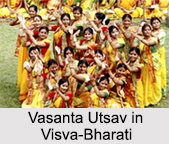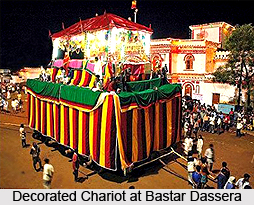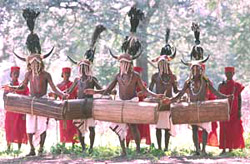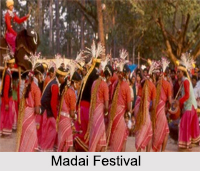Customs of Mizoram are unique, prevailing in the state since time immemorial, while many of them have also undergone transformations over time. Christianity in Mizoram has brought about great transformations in the lifestyle of Mizo tribes. However certain basic customs still prevail in the state. The missionaries had appreciated many of their customs and hence never tried to amend them. Harmful and meaningless customs were gradually eliminated from the society through preaching. Over time, Zu became the common beverage of the state instead of tea and modern education had replaced Zawlbuk. Animal sacrifices during ceremonial occasions were an inseparable part of the religious rituals which was later banned. But other customs of Mizoram, such as bride price payment, are still in practice in the state.
Matrimonial System in Mizoram
The custom of bride price is widely spread not only among the Mizo people but also among many other communities of India. The marriage proposal among Mizo people is following by the settlement of bride price. The marriage is fixed when the demand of bride price is agreeable to both the parents. The amount is paid by the bridegroom. The bride price is often paid in parts where a part is paid on the wedding evening and the other part, also known as `Thutphah`, is kept back for years in the form security. In case the husband dies, the obligation of paying the debt passes on to his son. The elder sister of the bride receives Naupuakpuan, which is paid to them for giving their clothes to the bride to wear. In case the bride is the eldest daughter, other female relatives of the bride receive this amount. Thianman is the amount paid to the maid of the bride. Altogether the bride price constitutes a huge amount.
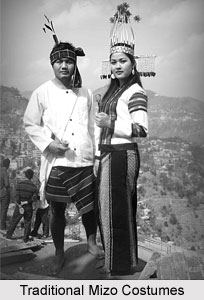 Style of Marriage in Mizoram
Style of Marriage in Mizoram
Courtship and engagement are the two prime phases of Mizo weddings. Free mingling is allowed between the girl and the boy during the period of engagement. In case the couple do not get along well with each other, the engagement can also be called off. Christianity is the major religion in Mizoram and hence most of the weddings take place in churches. Traditional as well as contemporary costumes are worn by the bride and bridegroom in the weddings as per the choice.
Puandum is a traditional rug brought by the bride for her husband. The rug is traditionally used to wrap the body of husband during burial. It is a compulsory custom and failure of the bride to bring the rug may result in deduction of bride price as a punishment. Mizo society follows a variety of wedding styles.
Makpa chhungkhung is a unique style of wedding in which bride price is not paid by the bridegroom; instead he goes to the bride`s home to live with her after marriage. This style is followed among the families which do not have any son and the son in law takes over the responsibility of taking care of the parents.
Luhkhung is another wedding style which takes place in the absence of any social ceremony. It takes place in the Vestry of the church instead of the main hall.
Tlandun is a style of marriage where the couple runs away from home and get married without the consent of parents.
Property Inheritance in Mizoram
In the society of Mizo people, the property is inherited by the men. The property of the family is primarily inherited by the youngest son however other sons may also receive portions of the property on the wish of the father. In case the family has no son, the next kin on the male side inherits the property. In case of the death of the husband, his widow and children are taken care of by a male relative till the children become adult. Absence of any male relative makes the widow the trustee of the property till her sons attain the age of inheriting the property. Although as per the customs, the younger son is entitled to the property, it is generally divided among all the sons. The women are entitled to the property only in the absence of any son or male relative. Written will can also allow women of the family to have right over the property.

